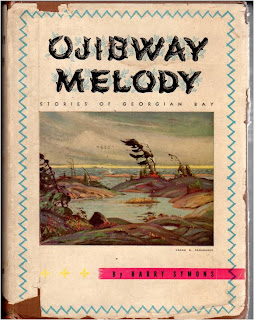I felt inspired.
After
hearing Professor Symons describe the impact of his father’s book Ojibway Melody, I imagined myself
writing an essay, maybe even a learned paper, on how a book of humour had shaped
modern Canada. The thought amused me.
Professor
Tom, son of humorist Harry Symons, established institutions, advised
politicians, mediated thorny issues, and may have done more than anyone else to
create the field of Canadian Studies. He
told me that his father’s self-published Leacock Medal winner had influenced
that life and career profoundly. All I had to do was roll up the evidence and
frame it with a few quotes. Still, I
needed some help with the details.
This
prompted me to contact another Professor, one closer to home.
Ralph
Heintzman, a former senior government official and now a prof at the University
of Ottawa, knew my subject well and even edited a highly regarded essay
collection Tom Symons: A Canadian Life. We met at his office one afternoon in the spring
of 2015.
Heintzman,
a man honoured for his commitment to integrity, ethics, and service, has a hard
time being unkind. But he might have
been justified in this circumstance.
“Well,
it’s an interesting idea,” he said after I laid out my proposal. “Tom Symons is
a romantic though - and might also have had motive in attributing things to his
father’s book.”
We
commiserated about government and governing and talked a lot about the subject
at hand, but I left the office unsure. Had I received a light endorsement or a
kindhearted pat on the head? Regardless,
I resolved to re-read A Canadian Life.
My
first reading, in 2013, was a search for biographical bits about
Harry Symons for reference in my book on Leacock Medal winners, and I found a
lot. But this time, I focused on the son
not the father and realized that the argument I wanted to make in my imaginary
paper had already been laid out thoroughly and gracefully in this essay
collection.
The
book not only documents how Tom Symons pioneered the academic and
multidisciplinary study of Canada, but also his leadership in establishing
Canada’s first department of Native Studies, his political policy work and his
contributions in promoting French-language education
in Ontario and human rights in Canada and abroad. It also frames these subjects with reference
to the philosophy and tone found in the pages of Ojibway Melody, which Heintzman read as it should be read, sitting
in a chair by a cottage on Georgian Bay.
Referencing quotes from the Leacock Medal book, Heintzman says directly that its “stories are filled with appreciation for certain human qualities of kindliness, gentleness, integrity, and courage” and the kind of character recognizable in the life and work of the humorist’s son Tom.
Referencing quotes from the Leacock Medal book, Heintzman says directly that its “stories are filled with appreciation for certain human qualities of kindliness, gentleness, integrity, and courage” and the kind of character recognizable in the life and work of the humorist’s son Tom.
I learned a lot from re-reading Tom Symons, A Canadian Life including that Ralph Heintzman is too
polite to ask “Did you really read my book?”
DBD
January 2016
